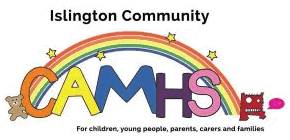We may all feel angry at times; it’s a natural emotional response to many things. Anger is a powerful emotion and releasing the pressure that builds inside you can be essential to deal with problems and move on. But if anger isn’t dealt with in a healthy way, it can have a significant effect on your daily life, relationships, achievements and mental well-being.
CAMHS A-Z
 We understand that no one likes to be labelled, however categorising difficulties in this way can mean that we may be able to understand someone’s behaviours in an easier way and also find the best solution for you.
We understand that no one likes to be labelled, however categorising difficulties in this way can mean that we may be able to understand someone’s behaviours in an easier way and also find the best solution for you.Anorexia
Anorexia Nervosa is a type of eating disorder. People with Anorexia Nervosa struggle to eat enough, because they may feel that their problems are associated with what they look like and by controlling their weight, it may mean to them that they can control other aspects of their lives. Beat is the leading charity for eating disorders and their website can give you more information.
Anxiety
ADHD (Attention Deficit Hyperactivity Disorder)
- a short attention span
- restlessness or constant fidgeting
- being easily distracted
Autistic Spectrum Disorder (ASD)
- Communication
- Understanding other people
- Understanding social rules
- Understanding emotions
- Imagination and flexibility
- Sensory processing: e.g. light, sound, texture
Alcohol Misuse
Alcoholism describes the condition where people get addicted to alcohol, and use it to escape other problems in their lives. Alcoholism is when social drinking changes into more regular, addictive patterns. Drink Aware and Don’t Bottle it Up have lots of information on alcohol and how to help someone who you think may be drinking too much.
Bipolar Disorder
Body Dysmorphic Disorder (BDD)
Body Dysmorphic Disorder affects people and the way they view themselves. It can lead people to become obsessed and preoccupied with their appearance, focusing on minor imperfections they may feel they have.
Borderline Personality Disorder (BPD)
- Difficulties making and maintaining relationships
- Having an unstable sense of identity (such as thinking differently about yourself depending on who you are with)
- Self harm or thoughts of self harm
- Experiencing emotions that are up and down
- Believing in things that are not real or true or seeing and hearing things that are not really there
Bulimia
Conduct Disorder
Depression
- Research has shown that exercise can help depression by releasing powerful chemicals into the brain
- Talking to someone they trust can help
- Prescribed medication such as anti-depressants
Dissociative Disorder
- Amnesia – where a person can’t remember incidents or experiences that happened at a particular time, or when they can’t remember important personal information
- Depersonalisation – which is a feeling that your body is unreal, changing or dissolving. It also includes out-of-body experiences, such as seeing yourself as if watching a movie
- Derealisation – where the world around you seems unreal. You may see objects changing in shape, size or colour, or you may feel that other people are robots
- Identity confusion – where you feel uncertain about who you are
- Identity alteration – where there is a shift in your role or identity that changes your behaviour in ways that others could notice. For instance, you may be very different at school from when you are at home. This would need to be much more extreme thanthe normal variation of behaviour that you would expect to see across different settings
Eating Disorder
Insomnia
Mental Illness
- some people do or say strange things
- they may hear or see things that nobody else can
- they may seem sad or cross all the time
- they may seem tired of have amazing amounts of energy
- they may hold strange beliefs
- they may believe someone or something is trying to harm them, so will seem scared all the time
OCD (Obsessive Compulsive Disorder)
Oppositional Defiance Disorder (ODD)
Oppositional Defiance Disorder (ODD) is as an ongoing pattern of anger-guided disobedience, hostility, and defiant behavior towards authority figures which goes beyond the bounds of normal childhood behaviour – if it begins to interfere significantly with everyday activities. Children suffering from this disorder may appear very stubborn and often angry. This may include behaviours such as trying to get other people in trouble, deliberately annoying people, loosing temper and arguing with adults.
Panic Attacks
- Rapid breathing
- Feeling breathless
- Sweating
- Feeling very hot or cold
- Feeling sick
- Feeling faint or dizzy
- Tingling fingers
- Shivering or shaking
- Racing heart or irregular heartbeat
Personality Disorder
- Make or keep relationships
- Get on with people at work
- Get on with friends and family
- Keep out of trouble
- Control their feelings or behaviour
Phobia
A phobia is described as an irrational or excessive fear of an object or a situation. Some common phobias are: claustrophobia (fear of confined spaces) and arachnophobia (fear of spiders).
Post-Traumatic Stress Disorder (PTSD)
- Vivid flashbacks (feeling as if the trauma is happening all over again)
- Intrusive thoughts and images
- Nightmares
- Intense distress at real or symbolic reminders of the trauma
- Repressing memories (being unable to remember aspects of the event)
- Feeling detached, cut off and emotionally numb
- Being unable to express affection
- Feeling there’s no point in planning for the future
Psychosis
Pervasive Refusal Syndrome
Schizophrenia
- difficulty thinking
- feeling controlled
- hallucinations
- delusions
- loss of interest, energy and emotions
- some people hear voices without negative symptoms
School Refusal
Self-Harm
Sleep Disorders
Substance Misuse
Drug addiction can relate to the excessive use of illegal drugs such as Cannabis, Cocaine and Heroin, or legal drugs that you would find on prescription. Talk to Frank is a national service for young people who are worried about drug addiction, it has an A – Z of drugs and a confidential helpline.

